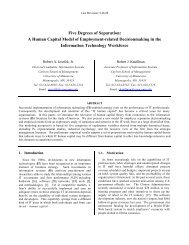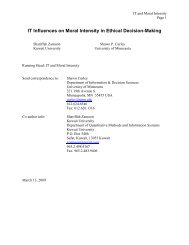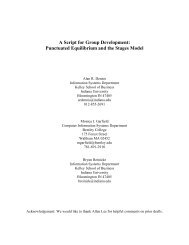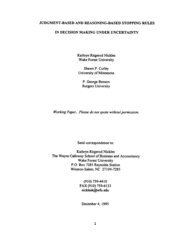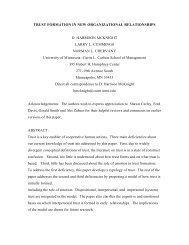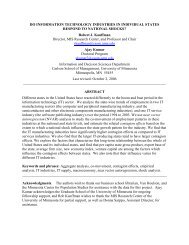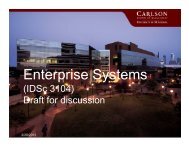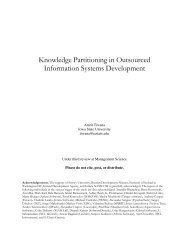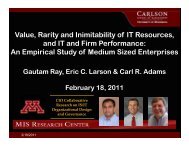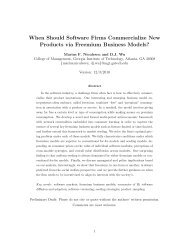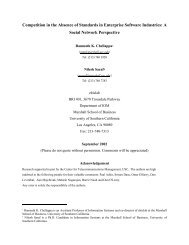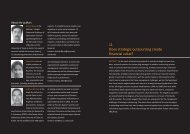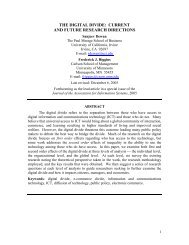Agent-Based Modeling to Inform Online Community Theory and ...
Agent-Based Modeling to Inform Online Community Theory and ...
Agent-Based Modeling to Inform Online Community Theory and ...
You also want an ePaper? Increase the reach of your titles
YUMPU automatically turns print PDFs into web optimized ePapers that Google loves.
interpersonal bonds <strong>and</strong> thus of receiving relational benefit. In other words, community-level mod-<br />
eration promotes informational benefit at the expense of relational benefit.<br />
In contrast, personalized moderation improves both informational <strong>and</strong> relational benefit,<br />
especially in communities that involve many <strong>to</strong>pics <strong>and</strong> heavy traffic. It is a technology <strong>to</strong> h<strong>and</strong>le<br />
the informational versus relational trade-off <strong>and</strong> can be effective even if the algorithms <strong>to</strong> predict<br />
interests are only moderately accurate (e.g., 60 percent precision in the simulation). The simulation<br />
results suggest that community managers can use personalized recommendations <strong>to</strong> create implicit<br />
clusters of users with similar interests so that members can choose <strong>to</strong> be exposed <strong>to</strong> a narrow or<br />
wide range of information, depending on their preferences, <strong>and</strong> return <strong>to</strong> their intimate circles for<br />
personal conversations. An increasing number of online communities are adopting this approach.<br />
For instance, newsvine.com 6 is a community in which members can rate <strong>and</strong> comment on news<br />
items from big <strong>and</strong> little media all around the world <strong>and</strong> <strong>to</strong> create their own columns as well. One<br />
of its offerings allows members <strong>to</strong> organize around common interests in<strong>to</strong> Newsvine groups so that the<br />
site becomes a smaller <strong>and</strong> more personal place for them. It also provides four venues through which<br />
members can personalize their social circles with whom <strong>to</strong> share their new s<strong>to</strong>ries: the public, a public<br />
group, a private group, or a private circle of friends.<br />
Another implication is that contingent <strong>and</strong> adaptive approaches are necessary <strong>to</strong> improve commu-<br />
nity design. There is no universally optimal design for all communities. When the risk of information<br />
overload is low, as in small, narrowly defined communities, the community thrives with no moderation or<br />
community-level moderation. As communities grow, attract more members, <strong>and</strong> accommodate more <strong>to</strong>p-<br />
ics, community designers <strong>and</strong> managers should consider personalized filtering <strong>to</strong> reduce information<br />
overload <strong>and</strong> assist members <strong>to</strong> find similar others <strong>to</strong> engage in interesting conversations. Even though<br />
personalized recommendations have been widely used <strong>to</strong> provide people with best personalized views of<br />
digital content, as in Google news <strong>and</strong> Amazon.com recommendations, it has been much underused <strong>to</strong><br />
recommend online conversations.<br />
6 http://www.newsvine.com/_cms/help/groups<br />
30



